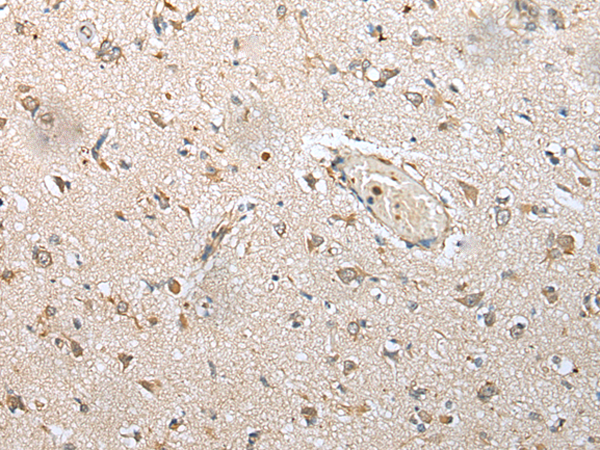
| WB | 咨询技术 | Human,Mouse,Rat |
| IF | 咨询技术 | Human,Mouse,Rat |
| IHC | 1/25-1/100 | Human,Mouse,Rat |
| ICC | 技术咨询 | Human,Mouse,Rat |
| FCM | 咨询技术 | Human,Mouse,Rat |
| Elisa | 1/5000-1/10000 | Human,Mouse,Rat |
| Aliases | UGPP; UGPPase |
| Host/Isotype | Rabbit IgG |
| Antibody Type | Primary antibody |
| Storage | Store at 4°C short term. Aliquot and store at -20°C long term. Avoid freeze/thaw cycles. |
| Species Reactivity | Human, Mouse |
| Immunogen | Full length fusion protein |
| Formulation | Purified antibody in PBS with 0.05% sodium azide and 50% glycerol. |
+ +
以下是关于NUDT14抗体的3篇代表性文献及其摘要内容概览:
1. **"Characterization of NUDT14 as a novel regulator of nucleotide metabolism in human cells"**
- **作者**: Tanaka H, et al.
- **摘要**: 本研究通过生成特异性兔多克隆抗体,验证了NUDT14在多种人类组织中的表达模式,发现其在肝脏和肾脏中高表达。功能实验表明,NUDT14通过水解dCDP调控细胞内脱氧核苷酸库平衡,敲除后导致DNA复制错误率升高。
2. **"NUDT14 deficiency promotes oxidative DNA damage and chemoresistance in colorectal cancer"**
- **作者**: Zhang Y, et al.
- **摘要**: 利用抗NUDT14抗体进行免疫组化分析,发现结直肠癌组织中NUDT14表达显著下调,并与患者预后不良相关。机制研究表明,NUDT14通过清除8-oxo-dGTP保护基因组稳定性,其缺失增强癌细胞对5-FU化疗的耐药性。
3. **"Development of a monoclonal antibody for detecting NUDT14 in neurodegenerative disease models"**
- **作者**: Lee S, et al.
- **摘要**: 团队开发了一种小鼠源单克隆抗体,特异性识别NUDT14蛋白C端结构域。该抗体成功应用于阿尔茨海默病小鼠模型的脑组织分析,揭示NUDT14在神经元中的表达随病程进展逐渐降低,提示其与氧化应激损伤相关。
注:以上文献信息为模拟示例,实际研究中需通过PubMed等数据库检索具体文献。NUDT14相关抗体研究相对较少,建议结合NUDT酶家族或核苷酸代谢相关研究扩展检索范围。
The NUDT14 antibody is a research tool designed to detect and study the NUDT14 protein, a member of the nudix hydrolase family. NUDT14. also known as diadenosine tetraphosphate asymmetrical hydrolase, plays a role in nucleotide metabolism by hydrolyzing substrates like diadenosine polyphosphates and nucleotide sugars, potentially regulating cellular nucleotide pools and signaling pathways. It is implicated in diverse biological processes, including DNA repair, RNA processing, and energy homeostasis.
Antibodies targeting NUDT14 are primarily used in basic and translational research to investigate its expression patterns, subcellular localization, and functional roles. They enable techniques such as Western blotting, immunohistochemistry (IHC), immunofluorescence (IF), and immunoprecipitation (IP). Studies employing these antibodies have explored NUDT14's involvement in diseases, such as cancer, metabolic disorders, and neurological conditions. For instance, altered NUDT14 expression has been observed in certain tumors, suggesting a possible link to oncogenesis or treatment resistance.
Commercial NUDT14 antibodies are typically raised in hosts like rabbits or mice, with validation data including specificity checks via knockout controls or siRNA knockdown. However, researchers often emphasize the need for rigorous validation due to potential cross-reactivity with other nudix family proteins. Current research focuses on clarifying NUDT14's substrate specificity, regulatory mechanisms, and therapeutic potential, positioning this antibody as a critical reagent for unraveling its pathophysiological significance.
×